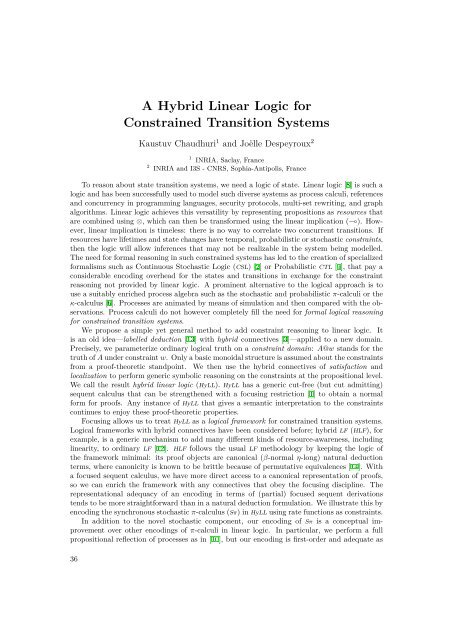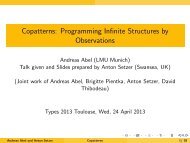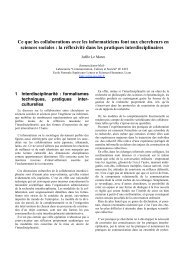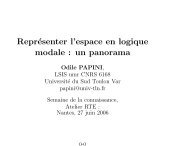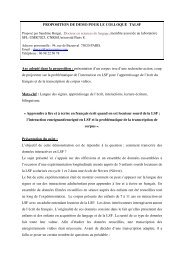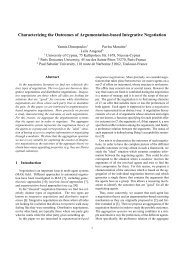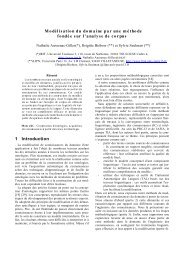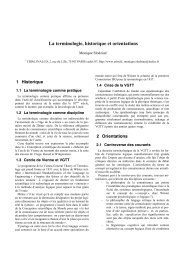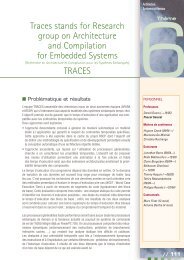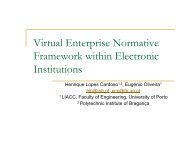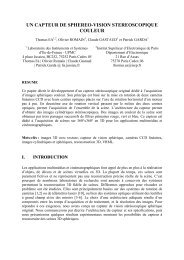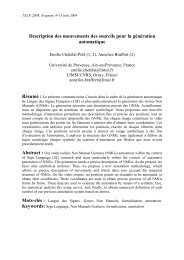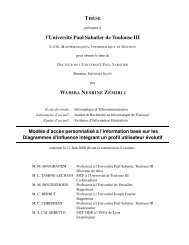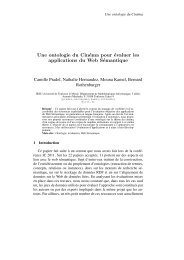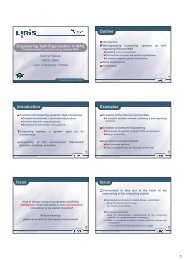Book of Abstracts - IRIT
Book of Abstracts - IRIT
Book of Abstracts - IRIT
You also want an ePaper? Increase the reach of your titles
YUMPU automatically turns print PDFs into web optimized ePapers that Google loves.
A Hybrid Linear Logic for<br />
Constrained Transition Systems<br />
Kaustuv Chaudhuri 1 and Joëlle Despeyroux 2<br />
1 INRIA, Saclay, France<br />
2 INRIA and I3S - CNRS, Sophia-Antipolis, France<br />
To reason about state transition systems, we need a logic <strong>of</strong> state. Linear logic [8] is such a<br />
logic and has been successfully used to model such diverse systems as process calculi, references<br />
and concurrency in programming languages, security protocols, multi-set rewriting, and graph<br />
algorithms. Linear logic achieves this versatility by representing propositions as resources that<br />
are combined using ⊗, which can then be transformed using the linear implication (⊸). However,<br />
linear implication is timeless: there is no way to correlate two concurrent transitions. If<br />
resources have lifetimes and state changes have temporal, probabilistic or stochastic constraints,<br />
then the logic will allow inferences that may not be realizable in the system being modelled.<br />
The need for formal reasoning in such constrained systems has led to the creation <strong>of</strong> specialized<br />
formalisms such as Continuous Stochastic Logic (CSL) [2] or Probabilistic CTL [9], that pay a<br />
considerable encoding overhead for the states and transitions in exchange for the constraint<br />
reasoning not provided by linear logic. A prominent alternative to the logical approach is to<br />
use a suitably enriched process algebra such as the stochastic and probabilistic π-calculi or the<br />
κ-calculus [6]. Processes are animated by means <strong>of</strong> simulation and then compared with the observations.<br />
Process calculi do not however completely fill the need for formal logical reasoning<br />
for constrained transition systems.<br />
We propose a simple yet general method to add constraint reasoning to linear logic. It<br />
is an old idea—labelled deduction [13] with hybrid connectives [3]—applied to a new domain.<br />
Precisely, we parameterize ordinary logical truth on a constraint domain: A@w stands for the<br />
truth <strong>of</strong> A under constraint w. Only a basic monoidal structure is assumed about the constraints<br />
from a pro<strong>of</strong>-theoretic standpoint. We then use the hybrid connectives <strong>of</strong> satisfaction and<br />
localization to perform generic symbolic reasoning on the constraints at the propositional level.<br />
We call the result hybrid linear logic (HyLL). HyLL has a generic cut-free (but cut admitting)<br />
sequent calculus that can be strengthened with a focusing restriction [1] to obtain a normal<br />
form for pro<strong>of</strong>s. Any instance <strong>of</strong> HyLL that gives a semantic interpretation to the constraints<br />
continues to enjoy these pro<strong>of</strong>-theoretic properties.<br />
Focusing allows us to treat HyLL as a logical framework for constrained transition systems.<br />
Logical frameworks with hybrid connectives have been considered before; hybrid LF (HLF), for<br />
example, is a generic mechanism to add many different kinds <strong>of</strong> resource-awareness, including<br />
linearity, to ordinary LF [12]. HLF follows the usual LF methodology by keeping the logic <strong>of</strong><br />
the framework minimal: its pro<strong>of</strong> objects are canonical (β-normal η-long) natural deduction<br />
terms, where canonicity is known to be brittle because <strong>of</strong> permutative equivalences [14]. With<br />
a focused sequent calculus, we have more direct access to a canonical representation <strong>of</strong> pro<strong>of</strong>s,<br />
so we can enrich the framework with any connectives that obey the focusing discipline. The<br />
representational adequacy <strong>of</strong> an encoding in terms <strong>of</strong> (partial) focused sequent derivations<br />
tends to be more straightforward than in a natural deduction formulation. We illustrate this by<br />
encoding the synchronous stochastic π-calculus (Sπ) in HyLL using rate functions as constraints.<br />
In addition to the novel stochastic component, our encoding <strong>of</strong> Sπ is a conceptual improvement<br />
over other encodings <strong>of</strong> π-calculi in linear logic. In particular, we perform a full<br />
propositional reflection <strong>of</strong> processes as in [10], but our encoding is first-order and adequate as<br />
36


